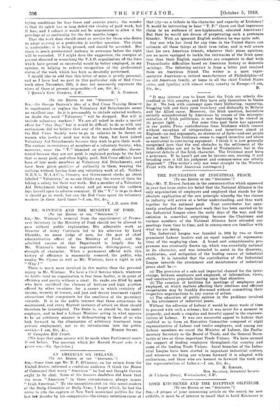AN AMERICAN ON IRELAND.
(TO THE EDITOR OF THE "SPECTATOR."] SIR,—Some time ago Mr. T. P. O'Connor, on his return from the United States, informed a credulous audience (I think the House of Commons) that every " American " he had met thought Carson ought to be shot. Some of his hearers doubtless did know that the term "American" in them. eircurnstaneeS always means "Irish-American." To the unsophisticated tin this sense) readers ef the Daily Chronicle or Daily News, I forget which, he had the nerve to cite the capture of New York municipal politics for the last few decades by his compatriots—the always notoriOus curse•of •
that city—as a tribute to the character and capacity of Irishmen! It would be interesting to hear "T. P." throw out that ingenuous claim to an audience of non-hyphenated, educated Americans! But then he would not dream of perpetrating such a grotesque blunder. With an ignorant English audience he was quite safe.
Any one who has lived for any time in the United States can estimate all these things at their true value, and is well aware that his own American friends, whatever their pious opinions, are no more equipped to tackle the intricacies of the Irish ques- tion than their English equivalents are competent to deal with Transatlantic difficulties based on American history or domestic sociology. The following extract is from a letter just received from an American friend. The writer is a most repre- sentative American—a retired manufacturer of Philadelphia—of an old American family, at home in all the chief United States cities, and familiar with almost every country in Europe.—I am,
" It may interest you to know that the Irish are utterly dis- credited in this country, and they have only themselves to blame for it. We look with contempt upon their blithering, vapouring, bragging talk and their rank treachery and disloyalty to Britain and the Allied cause. Moreover, the Irish question, heretofore entirely misunderstood by Americans by reason of the misrepre- sentation of Irish politicians, is now beginning to be viewed in its proper light. . . . For some time past there has appeared in our public Press contributions from Irishmen which consist without exception of vituperations and invectives aimed at England—no real arguments, no statement of facts—and our people are not fools! The Irishman seems to regard invective and abuse as equivalent to convincing argument. I think it is now generally recognized here that the real obstacles to the settlement of the Irish difficulties are not to be found at Westminster, but in the inherent defects of the Irish character. The Irishman must have a grievance. If he hasn't got one he invents one, nursing it and brooding over it till his judgment and common-sense are utterly impaired." [The writer's only son went straight to the Western Front with the first American contingent.]


































 Previous page
Previous page